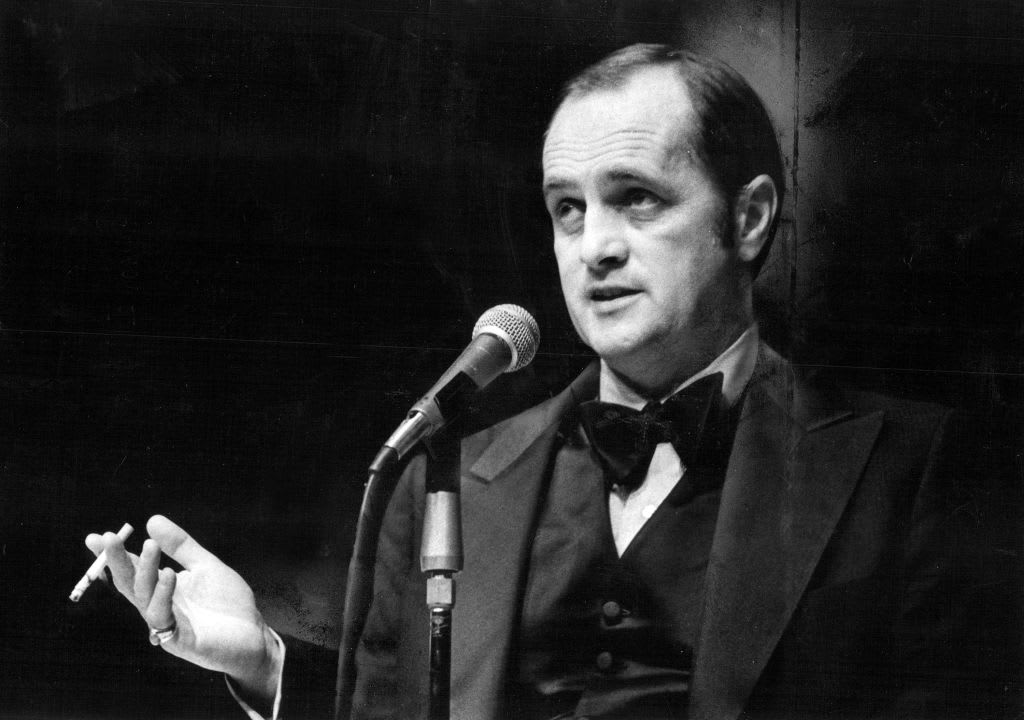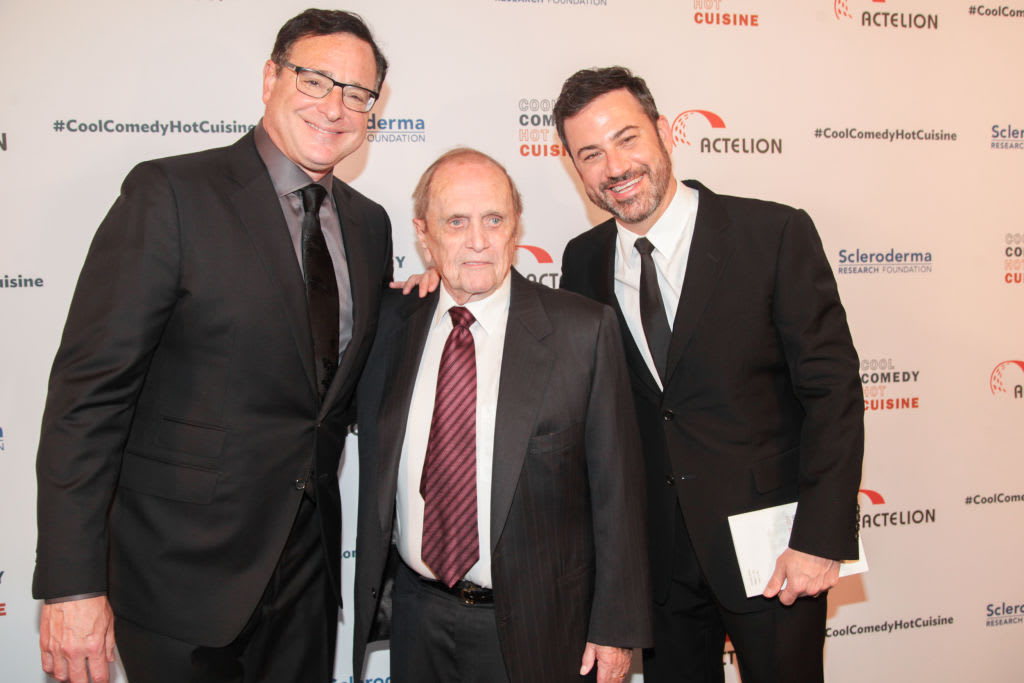In Bob Newhart’s second hit sitcom, Newhart, He played a Vermont innkeeper with a simple goal: to read his newspaper without interruption.
It never happened.
One of the people who interrupted him the most was Stephanie Vanderkellen, a spoiled heiress turned incompetent maid. Played by Julia Duffy, the character was young, energetic, blonde, and pretentious. Newhart played… Newhart.
From Monday morning table readings to Friday night tapings, Newhart and Duffy have danced together in comical ways. As a writer on the final season of Newhart, I was able to observe their chemistry with my own eyes. Both of them could laugh at the slightest gesture: a slow blink of the eyes or a raise of the eyebrow.
For their work on the series, Duffy earned seven Emmy nominations and Newhart earned three. (Incredibly, Newhart’s only Emmy win was as a guest actor in The Big Bang Theory.)
On July 18, when news broke of Newhart’s death at age 94, Duffy posted a sad tribute.
A few days later, I contacted her to offer my condolences.
“I’ve been thinking about it a lot this week,” Duffy said by phone. “And I wondered, ‘Has there ever been someone who was so seemingly inconspicuous, who had such a huge impact?’”
She continued: “Of course, if I told Bob that, he would say, ‘Well, there was Jesus.’ That would probably be his response. ‘And then there’s me.’”
Read this exchange out loud and you’ll hear how perfectly Duffy understood Newhart’s unique comedic voice. Here’s the rest of our conversation, condensed and lightly edited.
As one of the stars of Newhart, your name is forever linked to his, which must be nice.
It’s very nice. And it really touches me, to go back to the history of comedy and to all the people he worked with. And even to Jack Benny, who had a very big influence on him.
It seems to me that Bob was more open to the idea of women being funny than many men of his generation. In his first sitcom, The Bob Newhart Show, Suzanne Pleshette and Marcia Wallace were both hilarious. And he obviously enjoyed your work. Does that resonate with you?
It seemed to me that on our set, humor was paramount. Humor was king, nothing else mattered. That was the goal. It was sacred.
As for Bob’s opinion of me… You know, he never complimented me directly. I don’t think stand-ups do that. It’s not their language. And I never had any expectation or need to hear what he thought of my work. But he treated me as an equal from the start and that was all the validation I needed. That kind of equality hadn’t happened yet. We didn’t have Tina[Fey]and Amy. (Poehler) and the other standard-bearers. So being treated as an equal as a young woman in comedy was everything.
Also, Bob wasn’t one to brag. Early on, we were at a party and Ginnie (Newhart’s wife of 60 years) said to me, “Does he tell you how great he thinks you are?”
I laughed and said, “Not exactly, not really.”
Then she turned to him and said something like, “Newhart, you’re telling me all this… why don’t you tell him?”
It was just hilarious that Ginnie was so direct because Bob was so reluctant to express his emotions. I mean, he married the perfect person. She was wonderful. There was nothing you could do with Ginnie. And I love how she called him “Newhart.”

Bob Newhart performs at the Mill Run Theatre in Niles, Illinois in 1973.
William Vendetta/Chicago Tribune/Tribune News Service via Getty Images
Someone once said that Bob blinks his eyes in a funny way. Do you agree?
His blinks were as well timed as his pauses, his famous pauses. And the way he would stop before telling a joke, as if to say to the audience, “You can really start to get the joke and laugh now.” It was remarkable what he did.
I think of him as a “context comic.” That’s why he was so perfect for sitcoms. And even in his sketches, he would develop scenarios that the characters would react to, as if the head of the West India Company were talking to Sir Walter Raleigh on the phone and I hear about tobacco for the first time. (“So you roll it and where do you put it?… Between your lips, Walt? And then what do you do? (laughter and laughter) Do you light it on fire?”)
And usually it was about a person who had to deal with a situation for which he was completely unprepared. It was all about reacting.
I just did a few episodes of Night Court and I worked with Melissa Rauch, who is the sweetest person and, of course, I worked with Bob on The Big Bang Theory. And she really understands that pure humor doesn’t depend on the current era, the way we speak and the current memes. Because that changes. But when you find the funny in something timeless, that’s the purest and best comedy of all. Monty Python will be funny forever.
Newhart We didn’t make any current references. We desperately wanted it to still be funny decades later. And Melissa really understood that. She watched the show and wanted to follow in our footsteps. And it just seemed cosmic to me that this kind of pure comedy would be passed down from one generation to the next, respected, absorbed and perpetuated.
And I tell young people, if you’re interested in comedy, you have to know who Ernie Kovacs is. You have to know where we come from. I worked with Tom Poston who did a Bert Lahr number in vaudeville. I’m connected to that, to vaudeville, and I feel so lucky.
I loved WC Fields and I remember talking to Peter Scolari one time about the movie “Million Dollar Legs” and he said, “Well, the thing about Bill Fields is…” I’d never heard anyone call him “Bill Fields.” It was like they were old friends. But in a way, they were.
We were all comedy fans. In fact, Peter’s favorite comedian was Buster Keaton.
I remember one day my husband Jerry and I were getting ready to have a TV night with the kids to show them Abbott and Costello for the first time. Jerry said, “What if they don’t think it’s funny?” And I said, “Well, they’re out.” Luckily, they laughed a lot and both turned out to have very sharp senses of humor, so we were right to indoctrinate them.

Bob Saget, Bob Newhart and Jimmy Kimmel at a charity event.
Kathryn Page/Getty Images
When was the last time you spoke to Bob?
We spoke after his birthday last year. His birthday is September 12, the same as Peter’s (Scolari, who died in 2021 and is known to millennials as Tad Horvath, Heather’s father on Girls). And we had talked a lot because of the loss of Peter the year before.
Bob always responded to my messages, and then at some point it all started to go through Jerry (Digney), Bob’s longtime friend and publicist. And I realized it was too much for him. Ginnie had been gone for a year and I just couldn’t imagine Bob without her. It seemed impossible. He absolutely needed her.
But I was in touch with Courtney, their youngest child. And I knew Bob was home and the family knew this was coming, and they were all there.
Is there an episode or moment that you consider to be your favorite for you and Bob?
My most memorable moment was at the beginning. Stephanie’s character hadn’t been at the inn for very long. She had left home and her parents wanted her to come back. So in that episode, I had a phone call with my parents, which was really funny and, obviously, you only heard my version. And as I was rehearsing, Bob was walking across the stage with his coffee, and he stopped to look at me.
So I said, “Don’t look at me. You you can’t watch me make a funny phone call.
And he said, “It’s harder than it looks, isn’t it?”